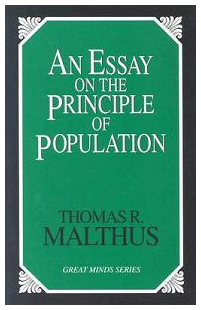
Whilst not the first book on population, "An Essay on the Principle of Population"is acknowledged as the most influential. First published anonymously in 1798, the author was soon identified as the Reverend Thomas Robert Malthus.
In 1803, Malthus published a major revision to his first edition, as the same title second edition; his final version, the 6th edition, was published in 1826. The excerpt below is from the sixth edition: even in this last edition, he still blames the poor and "court the return of the plague" on them.
- Excerpt from Book IV, Chapter V
6th edition, 1826. Library of Economics and Liberty. Free online, full-text searchable.
By Thomas Malthus:
"It is an evident truth that, whatever may be the rate of increase in the means of subsistence, the increase of population must be limited by it, at least after the food has once been divided into the smallest shares that will support life. All the children born, beyond what would be required to keep up the population to this level, must necessarily perish, unless room be made for them by the deaths of grown persons. ... To act consistently therefore, we should facilitate, instead of foolishly and vainly endeavouring to impede, the operations of nature in producing this mortality; and if we dread the too frequent visitation of the horrid form of famine, we should sedulously encourage the other forms of destruction, which we compel nature to use.
Instead of recommending cleanliness to the poor, we should encourage contrary habits. In our towns we should make the streets narrower, crowd more people into the houses, and court the return of the plague. In the country, we should build our villages near stagnant pools, and particularly encourage settlements in all marshy and unwholesome situations. But above all, we should reprobate specific remedies for ravaging diseases; and those benevolent, but much mistaken men, who have thought they were doing a service to mankind by projecting schemes for the total extirpation of particular disorders. If by these and similar means the annual mortality were increased ... we might probably every one of us marry at the age of puberty, and yet few be absolutely starved."

 RSS Feed
RSS Feed